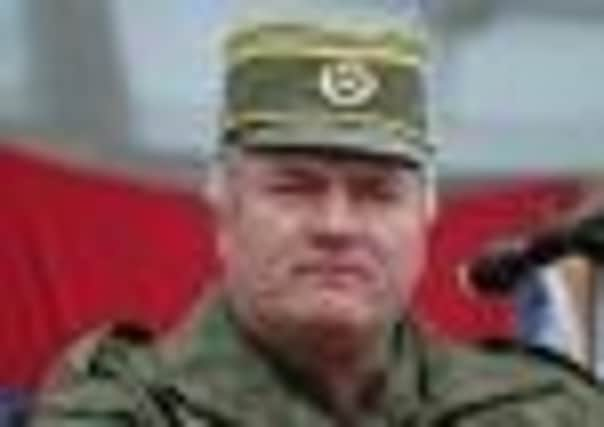Nick Quin: Mladic’s arrest is warning for Gaddafiof the long reach of international law


After a short process in Serbia, Ratko Mladic is en route to a court just a short tram ride across The Hague from that institution – the Yugoslav Tribunal (ICTY).
Mladic is the penultimate fugitive on a long list of most wanted compiled by the ICTY. He was indicted in the fledgling stages of the operation of the court; the first international tribunal to be convened since Nuremburg.
Advertisement
Hide AdAdvertisement
Hide AdSince then, the ICTY has become a blueprint for the ICC, and will form the basis of post-conflict legal processes in the future.
It has taken 15 years for the long arm of international law to catch up with a General who once promised his soldiers that they would drink blood.
Mladic was indicted after the massacre at Srebrenica in which 8,000 Muslim men and boys were slaughtered. It will no doubt be some time before the trial process properly commences.
The length of time for which Mladic has been a fugitive from the court is a strong indictment on Serbia’s recent history – with President Boris Tadic describing it as a “dark chapter”. But it is also a measure of the strength of international justice.
Advertisement
Hide AdAdvertisement
Hide AdThroughout its operation, the ICTY has faced down the opponents who protected Mladic, hid former Bosnian Serb leader Radovan Karadzic and remained loyal to Serbian president Slobodan Milosevic.
It has tried 126 people and built up a substantial, irrefutable record of the war that followed the collapse of Yugoslavia.
But it failed to conclude proceedings against Milosevic before his death, and continues to divide opinion in the Western Balkans.
Indeed, protestors have gathered to voice their support for Mladic, while in Croatia, former Colonel General Ante Gotovina is still considered by many to be a national hero, even after his recent conviction for crimes against humanity and violations of the laws of war.
Advertisement
Hide AdAdvertisement
Hide AdShould he study recent history, Gaddafi could look at a number of alternative actions for dealing with the fallout of conflict.
As well as processes in Rwanda, Liberia and Cambodia, Saddam Hussein was dealt with speedily for the killing of Shia Muslims in Dujail, and hanged, while Osama bin Laden was not afforded the luxury of due process.
The fact that the ICC prosecutor has issued an arrest warrant for Gaddafi will not be his paramount concern, with Nato bombs raining down on his compound. But the arrest of Mladic brings into focus what is needed of any process there may be to bring him to justice.
The Yugoslav example shows us how drawn out the international legal process is. As well as a detailed trial procedure and appeals process, there is the inevitable delay in bringing suspects to the court – indeed, one suspect, Goran Hadzic, remains at large.
Advertisement
Hide AdAdvertisement
Hide AdThis last element is the part of the process most dependent on international co-operation. In the ICTY’s case, its key partner has been the European Union.
The EU has been strongly involved in the post-war reconstruction and reconciliation process across the Balkans. A key part of that effort has been the offer, ultimately, of EU membership for the states.
The “powderkeg of Europe” has always been an area of convergence between East and West, but many have long looked to Europe. On the table for the Balkan states has been the prospect of EU membership, based on the process that saw Eastern European states included in the Union. But there has been a vital extra factor – co-operation with the Tribunal.
It was made clear to the leaders of states in the Western Balkans that they needed to deliver fugitives and support the Tribunal if they wanted to broaden their horizons towards Europe.
Advertisement
Hide AdAdvertisement
Hide AdThe arrest of Mladic is, therefore, a crucial milestone on Serbia’s road to Europe. His time at large, including appearances at football games and christenings, was a major embarrassment to Serbia. The focus now has to switch to the hunt for Hadzic.
But this significant bargaining chip will not always be there for international courts. No such offer has been available for Rwanda or Liberia, and no similar carrot can be dangled in front of post-conflict Libya should there be a legal process there.
The next test for the Tribunal is making sure that the justice process is completed against Mladic and, indeed, Karadzic, unlike against Milosevic. In the long term, it will be judged by the stability of the Western Balkan region – and the EU will play a major role in that.
Gaddafi will look on at the haggard figure of Mladic, whose time on the run had become increasingly uncomfortable, and recognise that, however long it may take, the long arm of international law is very much there.
* Nick Quin, from Leeds, holds degrees in Law from the Lse and War studies from kings College London, and has been an intern at the international Criminal tribunal for the former Yugoslavia.